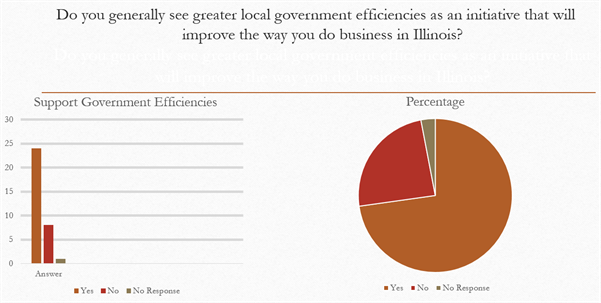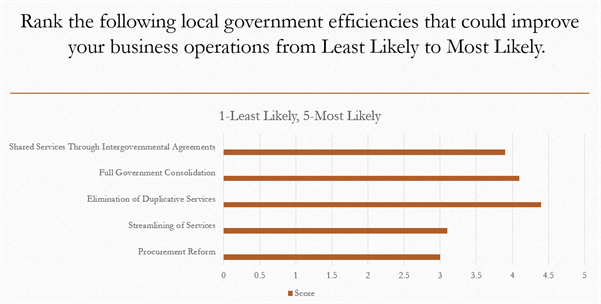
Flickr user visitBerlin (CC)
A survey of business owners found that greater government efficiency is a popular initiative in the business community.
 By Nathan Hoffman, Director of Advocacy, Illinois Chamber of Commerce
By Nathan Hoffman, Director of Advocacy, Illinois Chamber of Commerce - October 16, 2015
For our Behind the Numbers series, we're asking a variety of people—from University of Chicago Harris School students to our partners on the Transform Illinois coalition—to dive into the important question of why Illinois' 7,000 units of government should be more efficient. These posts offer policy makers guidance on where to direct local government reform efforts going forward.
Local government consolidation is not the most popular topic to discuss, but it may be the most imperative. At a time when the local government distributive fund is being targeted for cuts, a property tax freeze of some sort is on the horizon and a growing number of businesses are leaving the state because of government inefficiencies and over-taxation, the time to address the problem is now.
So what is the problem? Well, Illinois has nearly 7,000 units of local government, more than any other state in the nation. The sheer cost to sustain these governmental units is both inefficient and unsustainable.
However, just saying there are 7,000 units of local government really doesn’t do much in the minds of many without real numbers to support the issues. From the business community’s standpoint, the Illinois Chamber of Commerce was interested in finding out what exactly our members are thinking when it comes to this issue and how their operations are impacted.
We offered a voluntary survey to a number of our members who represent both large and small business as well as the local chambers of commerce. What we found is that business is incredibly interested in the concerns we have with regard to local government efficiency and consolidation. Overwhelmingly, nearly 75 percent of the survey respondents support greater local government efficiencies and consolidation.

Illinois Chamber of Commerce
A survey of business owners found that greater government efficiency is a popular initiative in the business community.
In regards to local government hurdles that businesses have to jump over, business owners told us the top hurdles they encounter when working with municipalities include high property taxes, duplication of services, a lengthy process, waste and inefficiency in resource allocation and a bloated bureaucracy. Looking at those responses, you can pretty much group them altogether in one category with the exception of the property taxes.
We asked our members to rank different efficiency strategies from “least likely” to “most likely” to improve business operations. They told us that eliminating duplicative services is the most likely way municipalities can help to improve business operations. This was followed very closely by full government consolidation and shared services through intergovernmental agreements.

Illinois Chamber of Commerce
Businesses ranked likelihood of certain government efficiency measures improving their business operations in the recent survey.
On our final pointed question, we asked our members what their number one concern is in regards to the many layers and sheer quantity of local governments across Illinois. Responses were varied but generally were in the same ballpark: “unsustainability of the layers of government,” “too many taxing bodies,” “red tape,” etc.
We received numerous comments on the survey from our members that were both thoughtful and welcomed. The consensus of these comments revolve around reducing bureaucracy, eliminating unnecessary governing bodies, and creating an environment where business can thrive. My favorite comment lamented “if (only) there were a way for some sort of statewide initiative to be (put) in place to teach municipalities how to operate efficiently.”
Responding to laments like these with constructive solutions is the reason the Illinois Chamber of Commerce is at the Transform Illinois table. Transform Illinois is a collaborative of public officials, civic organizations and research institutions dedicated to promoting and supporting local government efficiency efforts in Illinois, to improve the delivery of public services and infrastructure. At our conference on Nov. 2, we’ll offer straight talk and success stories to inspire more of what we all want to see: neighboring municipalities working together to provide shared services; local governments benchmarking their own performance using real data; and, yes, opportunities to consolidate services and governments while meeting the needs of local residents and businesses.
It’s often perceived as the business community versus the rest of the community in terms of the priorities that local governments should have. However, quite often it is the business community that has the sharpest insight into what those priorities should be, because they not only deal with local governments daily, but they also are obligated to make sure their own business is running as efficient as possible—otherwise, they don’t survive.
When we look at this whole idea of government consolidation and greater government efficiencies, what we can know for sure is that the business community is fully behind these efforts. Speaking for the business community, it is necessary to create the best environment possible so that businesses large and small can thrive. When businesses thrive, jobs are created, the economy grows and everyone gets a chance to prosper.
Illinois cannot afford, both literally and figuratively, to sit idle on this topic. Now is the time to capitalize on the political environment we find ourselves in. What is being asked, and what the Illinois Chamber of Commerce tells our members, is that this is not the obliteration of democracy as we know it. Neither is it going to reduce the quality of service communities receive. It will, however, provide for a stronger economy with more buy-in from the business community, a reduction in taxpayer overhead costs and a state that is more in line with reality.
Being practical is what this effort is all about. It will take buy-in from many different sectors of the community. The business community, for one, is ready and able to fully support this effort and see it through to the end. Our data supports what we believe, and our members are behind these actions. While full consolidation may not be the answer to every issue, there are obvious scenarios where it is the answer; however, we should never stop looking for greater efficiencies anywhere we can.
Learn more about this issue with other posts in the Behind the Numbers series.
Nathan Hoffman is the director of advocacy for the Illinois Chamber of Commerce, which leads and serves its own members as well as the entire Illinois business community. The Chamber is a member of Transform Illinois.